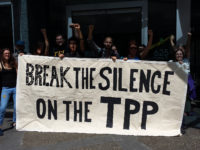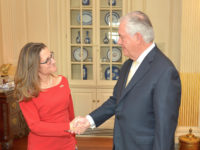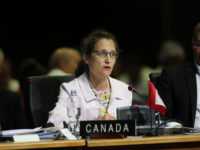While the NAFTA negotiations in Montreal were expected to be the lead trade story this week, the Trans Pacific Partnership talks in Tokyo have stolen the show with the remaining 11 countries reaching agreement on a deal that is likely to be signed in March. Canada faced intense criticism last year from some TPP partners (particularly Japan and Australia) over its demands to address concerns with the agreement. That sparked some Canadian business groups to quickly call on the government to simply cave in order to conclude a deal. Global Affairs Minister Chrystia Freeland and International Trade Minister François-Philippe Champagne rightly argued that capitulation is not a negotiating strategy and they now come away with an improved (albeit still flawed) agreement.
Post Tagged with: "freeland"
The NAFTA E-commerce Chapter: Ensuring the New Chapter Reflects Canadian Priorities
Canadian Foreign Minister Chrystia Freeland outlined Canada’s NAFTA negotiating objectives in talk earlier this week, identifying the need to modernize NAFTA so that “all sectors of our economy can reap the full benefits of the digital revolution.” I posted yesterday on how the IP chapter could be used to level the playing field for innovation. This post discusses how the new e-commerce chapter, which will be the most obvious manifestation of a modernized NAFTA, offers the opportunity to address an increasingly important aspect of modern cross-border commercial activity.
How Canada Can Use NAFTA’s IP Chapter to Level the Innovation Playing Field
The NAFTA renegotiation gets underway today, days after Canadian Foreign Minister Chrystia Freeland outlined Canada’s NAFTA negotiating objectives. As her first core objective, Freeland identified modernizing NAFTA so that “all sectors of our economy can reap the full benefits of the digital revolution.” Those comments suggest that the IP chapter and a new e-commerce chapter will be top negotiating priorities. I’ll post on the e-commerce chapter tomorrow, but this post highlights my recent CIGI essay on how Canada can use the NAFTA intellectual property chapter to help level the innovation playing field.
Canada’s NAFTA Council: Political and Industry Boxes Checked But Missing Key Perspectives
The Canadian government unveiled a new NAFTA Advisory Council yesterday as it prepares for trade negotiations that start later this month. The Council advising Minister Chrystia Freeland is an impressive one with broad representation from across the political spectrum and from many industry sectors. Indeed, the council is presumably as much about signalling the government’s priorities and including potential critics as it is about the substance of the negotiations. The committee therefore includes Conservatives (Rona Ambrose and James Moore) and NDP members (Brian Topp), Perry Bellegarde (national chief of the AFN), Hassan Yussuf (President of the Canadian Labour Congress) and a representatives from the automotive, energy, financial, agriculture, entertainment, and entrepreneurial sectors.
Freeland on the TPP: Taking the U.S. Out Changes a Delicately Balanced Deal
The Trans Pacific Partnership effectively died with the election of U.S. President Donald Trump, who wasted no time in announcing that the U.S. would not move forward with the agreement. Since the TPP cannot legally take effect without U.S. ratification, the decision to withdraw effectively kills the deal. The remaining TPP countries will meet in Chile next week to discuss what comes next. In advance of that meeting, Foreign Affairs Minister Chrystia Freeland appeared before the Senate on Tuesday and was specifically asked by Senator Joseph Day about the possibility of trying to salvage the agreement.
Freeland’s response:











